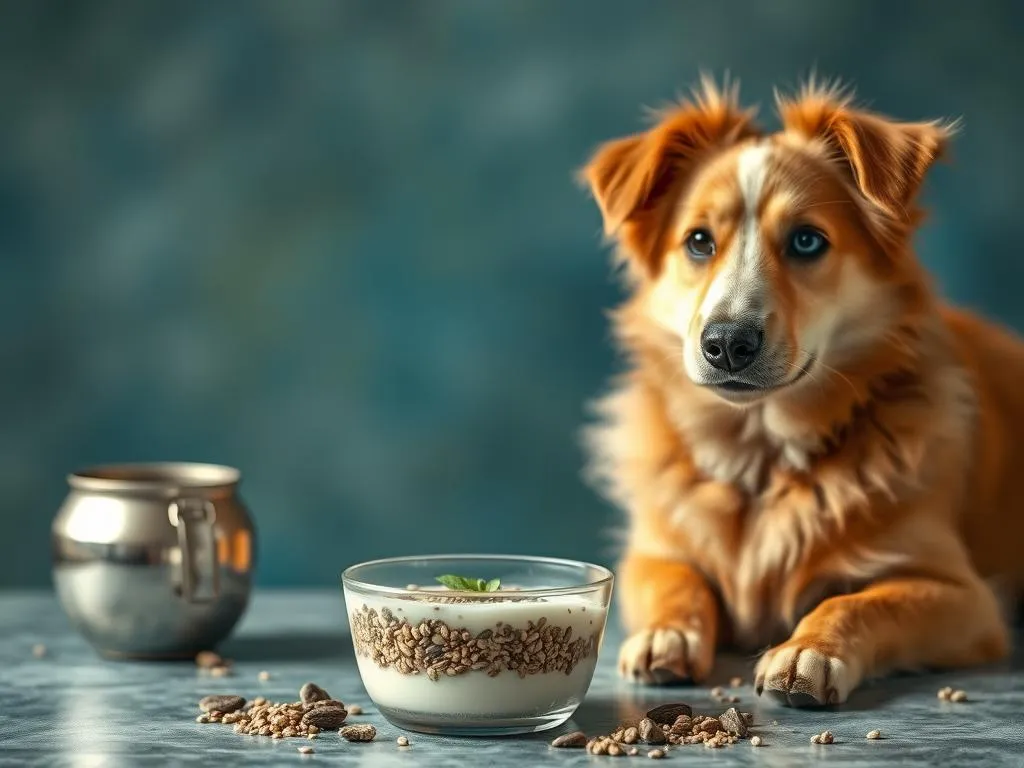
Introduction
Proper dog nutrition plays a critical role in maintaining a dog’s overall health and well-being. Just like humans, dogs require a balanced diet that meets their nutritional needs to thrive. One interesting addition to a dog’s diet is chia seeds, which have gained popularity for their numerous health benefits. But can dogs have chia seed pudding? Let’s explore the nutritional profile of chia seeds and whether this tasty treat is suitable for our furry friends.
Understanding Dog Nutrition
Essential Nutrients for Dogs
To ensure that our dogs lead a healthy life, we need to provide them with essential nutrients:
- Proteins: Crucial for muscle development, tissue repair, and overall growth.
- Carbohydrates: Provide energy and support digestive health.
- Fats: Important for healthy skin, coat, and overall energy.
- Vitamins and Minerals: Support various bodily functions and immune health.
Importance of a Balanced Diet
A balanced diet is vital for dog health. It helps maintain healthy weight, supports energy levels, and prevents common dietary deficiencies. Many dog owners may not realize that some commercial dog foods can lack essential nutrients, leading to health issues over time.
Different Types of Dog Diets
Understanding the types of diets available can help dog owners make informed choices:
- Commercial Dog Food: Convenient and often formulated to meet nutritional standards.
- Raw Food Diets: Focus on raw meat, bones, and vegetables, catering to a more natural feeding approach.
- Homemade Dog Food: Allows for personalized nutrition but requires careful planning to ensure all nutrient needs are met.
Introduction to Chia Seeds
Nutritional Profile of Chia Seeds
Chia seeds are tiny black seeds packed with nutrients. Their nutritional profile includes:
- High in Fiber: Aids in digestion and keeps your dog feeling full.
- Omega-3 Fatty Acids: Supports heart health and reduces inflammation.
- Antioxidants and Minerals: Provides essential minerals like calcium, potassium, and magnesium, which help support overall health.
Health Benefits of Chia Seeds for Dogs
Adding chia seeds to your dog’s diet can offer several health benefits:
- Improved Digestion: The high fiber content can enhance digestive health and regularity.
- Heart Health Support: Omega-3 fatty acids can help maintain a healthy heart.
- Anti-inflammatory Properties: May help reduce inflammation and improve joint health.
Can Dogs Have Chia Seed Pudding?
Ingredients for Dog-Friendly Chia Seed Pudding
If you’re considering making chia seed pudding for your dog, it’s essential to use safe ingredients. Here are some safe options:
- Chia Seeds: The star ingredient, rich in nutrients.
- Water: For soaking the seeds.
- Unsweetened Coconut Milk: A creamy addition that is generally safe for dogs.
- Fruits: Such as blueberries or bananas (in moderation), which can add flavor and nutrients.
Be cautious to avoid harmful additives like sugar, chocolate, or artificial sweeteners, which can be toxic to dogs.
Preparing Chia Seed Pudding for Dogs
Making chia seed pudding for your dog is simple. Here’s a step-by-step guide:
- Combine Ingredients: Mix 1/4 cup of chia seeds with 1 cup of water or coconut milk in a bowl.
- Stir Well: Ensure the seeds are evenly distributed and not clumped together.
- Let it Soak: Cover the mixture and let it sit for about 30 minutes to an hour until it thickens.
- Add Fruits: If desired, mix in small amounts of dog-safe fruits.
- Serve: Spoon out an appropriate serving for your dog.
Potential Health Benefits of Chia Seed Pudding for Dogs
Treating your dog to chia seed pudding can yield various health benefits:
- Digestive Health: The fiber helps maintain regular bowel movements and promotes gut health.
- Skin and Coat Benefits: Omega-3 fatty acids contribute to a shiny coat and healthy skin.
- Energy Levels: Nutrient-dense chia seeds can provide a natural energy boost.
Risks and Considerations
Potential Allergies and Sensitivities
While chia seeds are generally safe for dogs, it’s essential to be aware of potential allergies. Common signs of food allergies in dogs include:
- Itching or scratching
- Gastrointestinal upset
- Swelling or hives
When introducing chia seeds, start with a small amount and monitor your dog for any adverse reactions.
Portion Control and Moderation
Portion control is crucial. Recommended serving sizes depend on your dog’s size and breed but generally, a teaspoon for small dogs and a tablespoon for larger dogs is a good starting point. Overconsumption of chia seeds can lead to gastrointestinal distress, so moderation is key.
Consulting with a Veterinarian
Before introducing any new food to your dog’s diet, including chia seed pudding, it’s wise to consult with a veterinarian, especially if your dog has existing health issues or allergies. Your vet can provide tailored advice and help ensure that dietary changes are safe and beneficial.
Alternatives to Chia Seed Pudding
Other Nutritious Alternatives
If you’re looking for other healthy options, consider these alternatives:
- Pumpkin Puree: Rich in fiber and great for digestion.
- Sweet Potato Mash: Packed with vitamins and minerals, it’s a nutritious treat.
- Yogurt (Dog-Safe): Provides probiotics that can aid in digestion.
Creating a Balanced Diet with Variety
Including a variety of foods in your dog’s diet is important. This not only helps prevent dietary deficiencies but also makes mealtime more exciting for your dog. Mixing different healthy foods can provide a well-rounded nutrient profile that supports overall health.
Conclusion
In summary, chia seeds and chia seed pudding can be a nutritious addition to your dog’s diet, offering various health benefits. From improved digestion to enhanced skin and coat health, these tiny seeds pack a powerful punch. Experimenting with dog-friendly recipes can be a fun way to enrich your dog’s diet while ensuring they receive the necessary nutrients for a healthy life. A balanced diet remains crucial for canine health, so consider incorporating a variety of foods to keep your furry friend happy and healthy.









